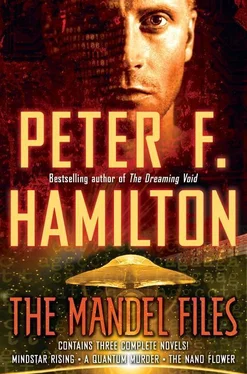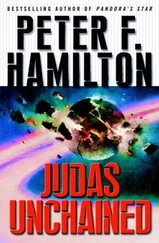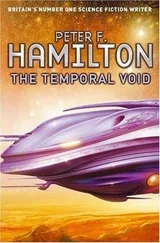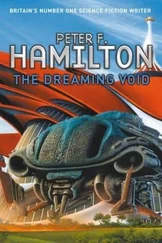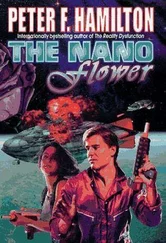Charlotte pressed her hand against the blue-grey roof of plastic. It felt tacky, slightly cooler than the surrounding air.
“Then there’s these ten doughnut-shaped ones spaced between the spheres, so we don’t waste any volume,” Fabian continued. They were underneath a deep curving valley where the spherical gasbag pressed up against a doughnut, taut wires securing both of them to the monolattice spars.
Charlotte let him guide her, not really listening to the details of what she was seeing. Fabian found a walkway leading off at right angles to the main one. It began to curve upwards. She was soon climbing a ladder to another walkway halfway up the side of the fuselage.
“I’m sorry about the way the staff treated you,” Fabian said. “It was jolly rude.”
Charlotte watched him flip the hair out of his eyes. She hadn’t realized he’d noticed the chill of the waiters as they served her at lunch, not many did. “They don’t count,” she said.
He considered this. “Oh. Does it happen to you a lot?”
“Sometimes.”
There were more turns, another flight of stairs. They arrived at a doorway. Charlotte didn’t have a clue where they were any more, except the unending buzz of the fans was slightly louder.
“Here we are,” Fabian said happily, and showed his card to the lock.
Charlotte looked round as biolum strips covered in protective grilles came on. The room had an industrial feel to it; a gloomy high ceiling, the walls covered in big thermal insulation panels. It had housed some heavy machinery in the past; the mountings were still there, jutting out of the walls, two rows of thick pipes rose out of the floor like stumpy chimneys, capped by metal plates, a spiderweb of empty cable ducts arched around the door. But it was a teenager’s den now. A rich teenager. There were flatscreens screwed to the walls, several hardware terminals and display cubes on old tables, piles of cushions, a music deck, a couple of electric guitars, large speakers, clothes scattered round, empty boxes, and ten large tanks full of tropical fish.
“This chamber used to hold the MHD units,” Fabian said. “When it was an ordinary passenger ship on the Pacific run the Colonel Maitland burnt hydrogen for power. The solar cell envelope doesn’t catch enough energy to power the fans, you see. But when Father had it refitted, we switched to gigaconductor cells. Saves an awful lot of weight.”
“So where does the power come from now?” she asked.
Fabian fell back into one of the beanbags, hands behind his head, beaming. “The Gulfstream has extra cells fitted, they charge up from the industrial grid every time it lands, then it transfers the electricity when it gets back.”
“So this is where you hang out, is it?” She peered at one of the fish tanks, admiring the vivid rainbow patterns on the guppies, suspecting genetic engineering featured prominently in their heritage.
“Yep.”
“Doing what, exactly?”
“I’ll show you.” Fabian jumped up, limbs jerking erratically, as though he was operated by wires. He tugged his T-shirt off. “This is really the most scorching game on the market. I love this. I’m good at it, too. Really good.”
She frowned, slightly bemused as he started to delve through a pile of junk. He pulled on a sleeveless shirt that was stained and torn, then started to clip on what looked like body armour. A metal breastplate painted in jungle camouflage; it had a small spotlight that stood above his left shoulder on a stalk.
“That screen,” Fabian told her, urgently. Watch that one.” He was typing quickly on a complicated-looking terminal. “Please, Charlotte.”
“Sure.” Your daddy’s paying for it, after all. She saw he had acquired a GI helmet with a small radio mike hanging down. He picked up a bulky gun, some sort of cross between a shotgun and a semi-automatic rifle, and stood in the centre of a circular black mat.
There was something weirdly familiar about the costume. Then the theatre-sized flatscreen on the rear wall lit up.
A cramped room illuminated by dull red lighting, metal lockers forming walls and narrow aisles. Figures frozen in an alert pose, all of them holding the same kind of rifle as Fabian, all looking up at the ceiling with expressions of worry and concern. Charlotte recognized the woman in the centre:
Sigourney Weaver. “I know this,” she said. “It’s from Aliens.”
Fabian laughed. He was abruptly engulfed by a two-metre bubble of holographic light, a shadowless pearl haze. Faint coloured lines flickered around him, an exoskeleton drawn in blue, as though he had been cocooned by a computer graphics display.
The scene on the flatscreen came alive. And there was Fabian, one of the space marines, firing his gun wildly as the aliens crashed down through the command centre’s roof. He had obviously perfected his chosen role, screaming obscenities, blasting the creatures apart in eruptions of green and yellow gore, covering the retreat back to the medical centre. Then one of the aliens punched up through the floor at his feet, and he went down firing defiantly until a black skeletal hand clamped over his face, dragging him to oblivion. A last terrified scream and he was gone.
Charlotte laughed delightedly, clapping and whistling. “Encore!” She didn’t have to fake it. Almost all of her patrons tried to impress her, showing off their sophisticated art collections or delicate antiques, lecturing her extensively on every piece, demonstrating how cultured and refined they were, always hoping for an admiration which wasn’t entirely bought. No one had ever tried to woo her with anything remotely like this before, not simple enjoyment. It was all so gloriously childish. She couldn’t help wondering how she would look up there on the big screen.
Fabian clambered back to his feet, and slung the chunky rifle over his shoulder. His face split with a rich happy smile. “See, told you I was good. You can pick whatever character you like. I love playing Hudson; he’s a real fighter. He’s scared the whole time, but he’s tough too when it counts. I know his dialogue off by heart.”
“You were brilliant.” She went over to the terminal he had activated, there were three times the usual number of keys. “What is this?”
“Videoke. All the companies and kombinates say it’s going to be their supernova sales item this Christmas. Father got me this deck in advance; he’s trying to buy a big consignment of them for Central America. The software houses have only remastered fifty movies for interactivity so far. I’ve got them loaded in the deck’s AV memox; all the real classics since cinema started, even some black and white ones.”
“It’s wonderful, Fabian.”
“Do you want to try it?” he asked generously. “You could be Ingrid Bergman in Casablanca, or Laura Dern in Jurassic Park, you’re easily beautiful enough.”
“Thank you, flatterer. I will some time, once I’ve learned the lines. If I’m going to do it, I want to do it properly, like you. I’ll have to find the right clothes, too.”
“I could do the Humphrey Bogart part with you.”
“Yes.” She read the list of films the videoke deck’s flatscreen was displaying. Snow White in the Disney cartoon would certainly be a challenge. And which dwarf could Fabian be? She chuckled quietly to herself.
Fabian slowly took his helmet off. His hair was all sweaty, clinging to his scalp. “Charlotte.”
She looked round at him, surprised by his serious tone.
“I meant it when I said you were beautiful.”
“Thank you, Fabian.”
“I couldn’t believe it the first time I saw you.” His pose of assured confidence crumpled, shoulders slumping inside the green armour. “I thought I was dreaming. I knew you’d be pretty, but-”
Читать дальше
